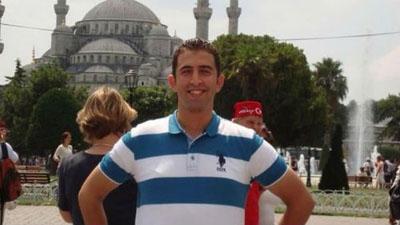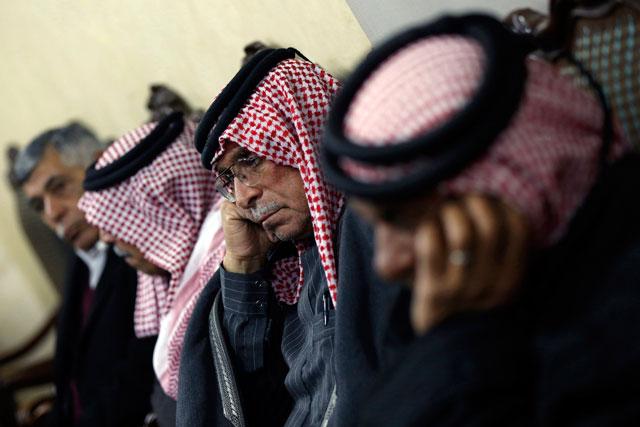You are here
Fate of captured air force pilot grips nation
By Omar Obeidat - Jan 31,2015 - Last updated at Jan 31,2015

AMMAN — Many Jordanians describe the past five days as “very stressful” as they have been gripped by the unknown fate of the Jordanian air force pilot captured by terrorists more than a month ago.
In phone interviews with The Jordan Times, several people from across the Kingdom said they have been obsessed with news about the fate of Muath Kasasbeh after the government announced it was ready to negotiate a deal with the so-called Islamic State (IS) to swap terror convict Sajida Rishawi for the 27-year-old pilot.
Kasasbeh was captured by the terror group on December 24, 2014 after his fighter jet went down near the Syrian city of Raqqa, a stronghold of IS.
Rishawi is an Iraqi woman who was convicted for her involvement in the 2005 Amman hotel bombings.
Last Tuesday, the IS group demanded her release to free Japanese hostage Kenji Goto or it would kill the Japanese journalist and Kasasbeh.
But the government said it was willing to release her in return for the pilot and demanded that IS show proof of life for Kasasbeh, a demand IS has so far failed to respond to.
“We need to know if the pilot is still alive. That is the most important thing for the people right now,” said Ibrahim Zureiqat, from Karak.
Zureiqat, who is from the same southern governorate as the captive pilot, said he has been checking the news every five minutes to see updates on the swap deal.
Ahmad Al Amro, also from Karak, had the same concerns, saying he was hopeful the pilot would join his family soon.
The past few days have been tough for everyone in the country because waiting is difficult, the 62-year-old said.
Jamal Haddad, from the northern Governorate of Ajloun, said he sympathises with the pilot’s family and that he, as well as all the people he knows, are engrossed with the fate of Kasasbeh.
“We have been switching from one news channel to another very often and regularly checking updates on mobile phones over the past few days,” Haddad said.
But some people interviewed by The Jordan Times were critical of the pilot’s relatives.
Ahmad Shuha, from the northern city of Irbid, said he disapproved of the way the family addressed the issue of their son, referring to sit-ins staged by members of the Kasasbeh tribe near government departments asking the authorities to positively respond to IS’ demands.
“I’m against pressuring authorities here to agree to the swap deal in an emotional manner because of the family,” he said, adding that the pilot was representing Jordan in a war against terrorism and was not representing the family or the area he came from.
However, Shuha said he was following the latest updates with concern and waiting to hear some “good news”.
Amal Mustafa, a resident of Zarqa city, agreed.
Kasasbeh, she said, “is the son of all Jordanians because he was on duty to defend the country”.
Expressing her understanding of the feelings of the pilot’s mother and father, Mustafa said they should have declared that they would accept the fate of their son because he was representing the nation.
Related Articles
Although Jordan expressed readiness to set free a convicted terrorist in return for the freedom of a Jordanian pilot taken hostage by the so-called Islamic State (IS), the latter did not respond to the proposition but sent another ultimatum to the pilot’s family, hours after a first deadline set by the group ended.
Jordanians on Wednesday were preoccupied with news concerning a possible deal between the government and the so-called Islamic State (IS) group to release Jordanian pilot Muath Kasasbeh in return for terror convict Sajida Rishawi.
The council of Karak tribes on Saturday named Safi Kasasbeh, the father of Jordanian martyr pilot Muath, as its president.












